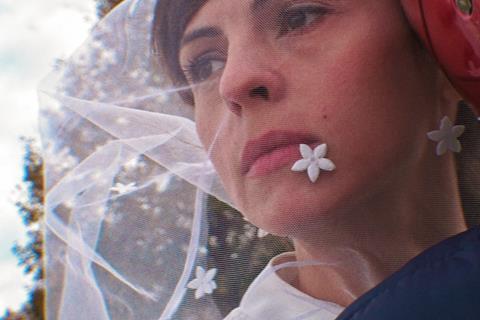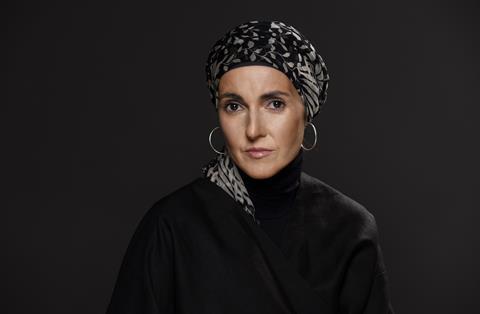
Sarajevo-born director Aida Begić’s A Ballad plays in Competition at this month’s Sarajevo Film Festival.
It is the Bosnian director’s first film to premiere in her hometown. Begić first made her mark with her 2001 graduation short, First Death Experience, which played in Cannes’s Cinefondation. Her feature debut, Snow, won the Grand Prix at Cannes’ Critics’ Week in 2008, and she later returned to the festival with Children of Sarajevo (2012), winner of a Special Distinction in Un Certain Regard. She also shot segments of the portmanteau films Do Not Forget Me Istanbul (2010) and Bridges of Sarajevo (2014), the latter of which premiered in Cannes as a Special Screening. Her last feature film was 2017’s Never Leave Me.
Inspired by a traditional Bosnian folk song, A Ballad centres on a thirty-year-old wife and mother who moves back into her parents’ home after her marriage deteriorates. Trapped by old fashioned rules and expectations, she finds hope in an unusual project: against the wishes of everyone around her, she decides to audition for a role in a film set to be shot in her neighbourhood.
A Ballad won the Eurimages Co-production Development Award and a CineLink Award at the 2015 Sarajevo Film Festival. It also won a CineLink Work in Progress award in Sarajevo in 2021.
The film was produced by Aida Begić for Film House Sarajevo, Adis Đapo, and Erol Zubčević.

A film from you with the same title was initially announced in 2015. Is this the same film, or has it changed? What inspired you to make it?
We announced it and got our first development money in 2015. We thought it was going to be a really quick project, and we had ambitions to make it a big co-production. But then, we got an offer to make workshops with Syrian orphans in the eastern border between Turkey and Syria. Because we had a lot of experience working with such children here in Bosnia, my crew and I thought perhaps we could do something for those kids. That’s how we switched to another project I made, called Never Leave Me. It took a few years to finalise it, then we decided it was time to go back to A Ballad. We were just about to start shooting when the pandemic started. That’s why we were unable to work with foreign co-producers; we were just stuck in Sarajevo.
But I tried to use this challenge as an opportunity: for the first time we were on our own, and I felt free to do things the way I wanted them.
It was a really good experience for me in that sense, because as a director, as an artist, I felt that I needed to move away from heavy and serious subjects, which I’d dealt with in my previous three movies. With A Ballad, I thought “this is going to be something that I was supposed to do maybe 20 years ago.” If there hadn’t been a war here, I would have made something that was funny and free, maybe a love story, without any political or any heavy social elements in it. So, it was a big relief for me as a filmmaker.
You said it wasn’t a European co-production this time. So how did it come together in terms of financing?
For the development, we got money from Creative Europe’s Media programme, as well as a Eurimages Development Award at the Sarajevo Film Festival.
Then we got local funds here in Bosnia as well as money from the local Canton of Sarajevo. We got the Work In Progress Sarajevo Film Festival Award from TRT too, which really helped us finalise the movie. We were just building it up little by little, and it was not a big budget.
I discovered that there is an advantage to doing micro budget and low budget productions. I think that the changes affecting cinema and the distribution of films, especially arthouse films, will go in this direction: we will have more small budget productions that people will be able to do quickly, with more freedom and maybe one co-producer; more very expensive productions; and fewer mid-budget films of the kind we used to do, between one and a half and two million euros. Also, you are less likely to be co-producing with faraway countries, which used to be a really big trend in European cinema.
Maybe this return to regional co-productions isn’t bad. Maybe new platforms and centring on your own language or similar languages will bring some fresh air in European art house cinema.
How did you work with your actors?
The way I work with actors is really specific. I have some version of the script, then I get my cast, I bring them together and we read it like in the theatre. Then we talk about the characters, and I rewrite another version of the script. Then I will need to have the locations too. That’s how I build another version of the script. I also do rehearsals on the spot with my actors, as I don’t want them to just learn their lines. I like to create during the shooting and not only to execute the script. I like to bring the actors into my world, and to do so early so that they can live with it for a while. Together, we develop details regarding their characters.
I also like to work with non-professional actors. This film was based on a famous oral poem from Bosnia, and oral poems were made by people, they weren’t written by one poet. I wanted to make a movie that would be created not only by me, but by people, like those folk poems. So I knew that I needed to bring ordinary people into it. With Timka Grin, my casting director, we travelled around meeting people before the pandemic. We also had a big audition where we invited people to sing and dance and to show us what they could do. In the end, I have only about nine professional actors. All the extras, even the people in small roles, are non-professional actors. They, too, created this movie, because I put some of the things they offered us during the auditions into the movie.
Is that one of the reasons the film is premiering in Sarajevo?
Sarajevo is the perfect place to have the premiere of this film. I think that this is the place where people can really feel every second of this story. It’s dedicated to people who are from here, it was made with people who are from here. And it will be my first world premiere here, which is also really important for me. I’m more excited than I would have been in any other foreign country.






![The Brightest SunScreen[Courtesy HKIFF]](https://d1nslcd7m2225b.cloudfront.net/Pictures/274x183/3/5/0/1448350_thebrightestsunscreencourtesyhkiff_312678.jpg)


















No comments yet